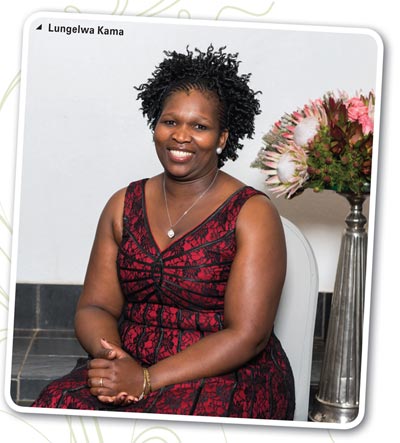August 2015
LOUISE KUNZ, SA Graan/Grain contributor
 They say it's all in a name and the name Lungelwa means "all will be well". For the 2014 Grain SA/Syngenta Smallholder Farmer of the Year this has been true.
They say it's all in a name and the name Lungelwa means "all will be well". For the 2014 Grain SA/Syngenta Smallholder Farmer of the Year this has been true.
Lungelwa Kama from Maclear in the Eastern Cape started farming by buying a small herd of cattle and sheep. At first she struggled to find grazing for them, but when the Department of Rural Development and Land Reform (DRDLR) made a farm and a few implements available to her, Lungelwa was on her way to becoming a commercial farmer and knew then that all would be well.
Ups and downs of farming
She mentions that the effect of the drought and the fact that she did not have enough capital to purchase feed for her livestock in her first year of farming, were the biggest stumbling blocks she has had to overcome in her short farming career. This however only made her more determined to succeed. With eyes firmly fixed on her goal, she knew that she would benefit by obtaining more knowledge about farming. Lungelwa then joined the Ugie Grain SA study group and started attending the Grain SA training courses. “Grain SA has been my biggest support in my farming career as far as crop production and business principles goes,” she says.
The farm she received from the DRDLR has only 35 ha of arable land, but Lungelwa and her husband, Vuyani, managed to hire an additional 70 ha of good arable land. Since then, this mother of three has expanded her land and now grows maize (160 ha) with an expected yield of 8 tons/ha as well as 9 ha of potatoes and 2 ha of other vegetables. She currently owns 704 sheep and 208 cattle and rents grazing land from the timber company operating in Ugie (PG Bison). Apart from the two awards she has received, her proudest farming moment has been the 80% lambing average after the drought.
Women’s involvement
This accomplished farmer who received the Female Farmer of the Year award from the Department of Agriculture Forestry and Fisheries in 2013 feels strongly that more women should become involved in farming. She is sure that promoting farming as a business during women conferences at churches would motivate more women to become interested in ensuring food security in the country. Where possible, she would like to motivate female farmers to attend Grain SA study groups to obtain more knowledge about farming practices whereby improving their skills.
Vusi Ngesi, who is Lungelwa’s Grain SA’s grain producer development co-ordinator, says that Lungelwa’s success can be attributed to her passion for farming, the support of her family and Grain SA’s training and on-farm visits.
The future
The Kama’s have built a lovely home on the farm where they live with their children who are also developing a love for farm life, but the energetic Lungelwa’s dreams for the future revolves consistently around farming. She hopes to grow her farming enterprise so that she can purchase more land in the near future and would also like to own her own abattoir one day. “I want to become a fully-fledged commercial farmer producing in excess of 1 500 ha of grain towards food security in the country,” she mentions.
About the future of agriculture Lungelwa says the following: “Agriculture in South Africa definitely has a future if government can put more money into developing farmers. Subsidising young people who are interested in a career in agriculture would give students the opportunity to invest in the future of the country’s food security.” She believes that the key to success is knowledge and adds that her father, who was a farm worker, is her role-model because he earned a small salary, but was determined to provide a good education for his children.
This successful developing farmer regularly donates vegetables to the Maclear and Elliot Hospitals. Lungelwa would like to be remembered as a hard-worker who appreciated what was given to her.
“I also want to be remembered as a generous person who loves embracing people,” she adds.
Did you know?
Publication: August 2015
Section: Relevant